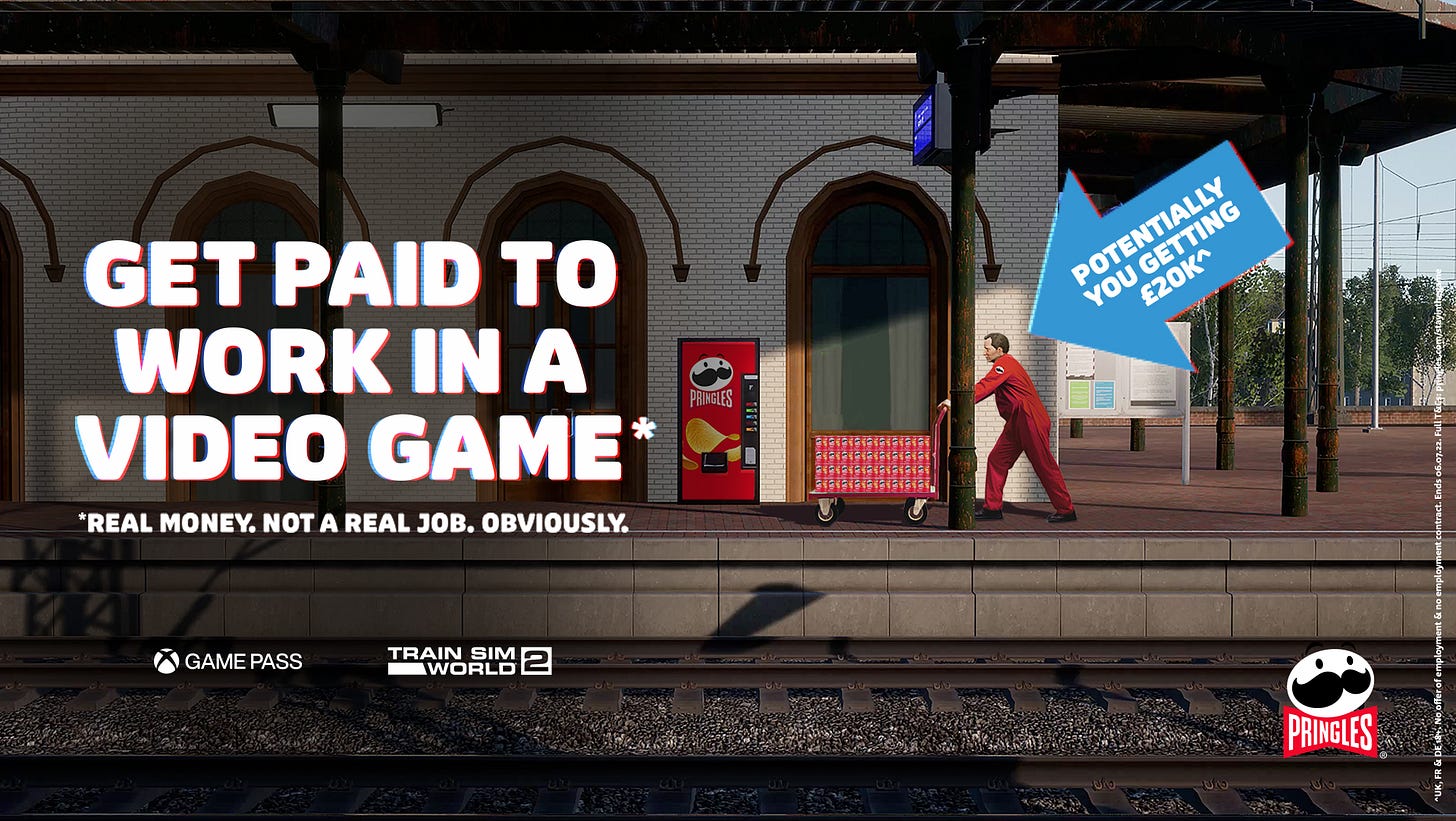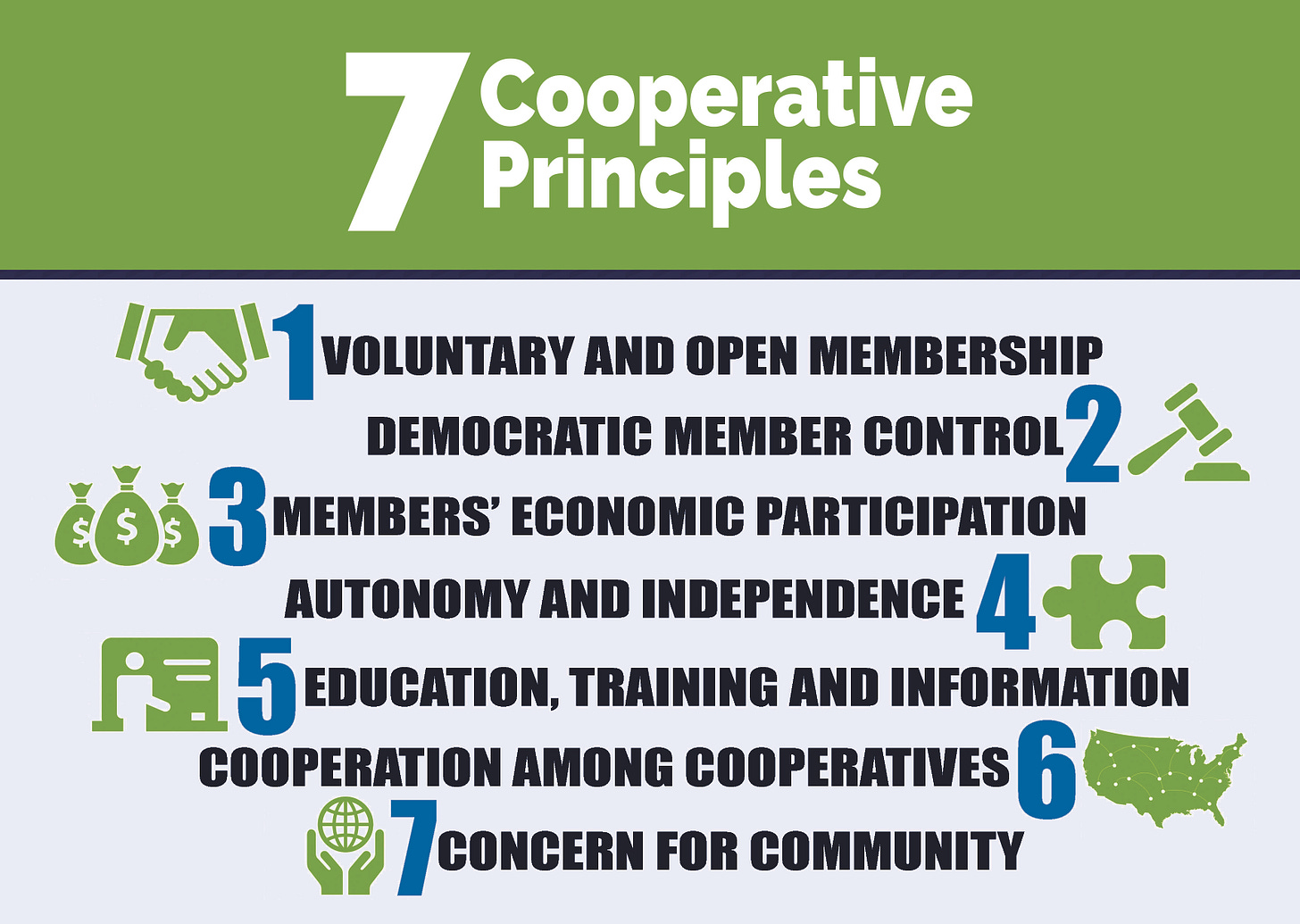Spatial Newsletter™ #033
This week we're going to focus on DAOs and co-ops, metaverse, Web3, AWE Nite Northern XR & more!
Spatial Newsletter™ is back from its summer hiatus! Welcome! A lot has happened over the past month, so in this edition we’ll be playing a bit of catch-up as well as going into something that I’ve wanted to get into for awhile, cooperatives and how they might relate to DAOs.
“I visited many places, Some of them quite
Exotic and far away,
But I always returned to myself.”
― Dejan Stojanovic, poet & entrepreneur
You Lost Your Menial Job in the Metaverse
Bummer. Some chip-head won the Pringles contest to become a vending machine filler for $24k/yr in the latest Sims game.
As the advertising agency that came up with the campaign Grey London puts it,
“Who wouldn’t want to become an NPC? Everyone talks about robots taking our work, but now we have the chance to take theirs.”
Who wouldn’t want to become an NPC…? Uhhh… <Proceed to count off on fingers> An actual player. A person who doesn’t want their work to be ‘robotic’. A robot. And, if we go by the movie Free Guy, even an NPC doesn’t want to be an NPC.
On the neon side of things, at least Grey London and Pringles are sticking close to the dystopian roots of the metaverse.
“Wow, Joh, summertime hasn’t brightened you up a bit.” I drink my lemonade without sugar or ice, what do you expect?
In case you missed it,
Japan Has Shattered the Internet Speed Record
Egads! What does this mean for the timeframe for a future metaverse now?
(Thanks to al XandR (Alex) Bagg for sharing.)
A Healthy Solution for Avoiding the Coming Metaverse Monopoly?
Alan Smithson posted Epic Games’ Tim Sweeney’s epic quote:
"The Metaverse is going to be far more pervasive and powerful than anything else. If one central company gains control of this, they will become more powerful than any government and be a god on Earth."
XR veteran and Creative Director of Cosmogon Creations Dragan Stiglic commented:
“Healthy solution is to start with few or many little metaverses to choose from. This can be possible only by neutralizing current big monopolies.
At this moment - it's hard/impossible task - as any metaverse would need to be built around one of only 3 operating systems. These 3 OSs run only 4 major browsers.
Sure, you can start building on someone else's land...
But who's in the power?
System/Agenda that prevented development of alternative operating systems will surely want to prevent developing any Metaverses that “they” can't control, buy, or… destroy[…]
The path is:
1. Slow-down.
2. Create environment where you can avoid monopolies.
3. Find new way to transmit digital data (Cable-free way)
4. Motivate creations of new operating systems
5. Create New Concepts to make Multiverse fully usable
6. Only when 1-5 is done - you can start building : )
Or... rush/risk building Metaverse inside someone's cage.”
What do you think about Dragan’s advice, Spatialists?
Metaverse beyond the hype: Multidisciplinary perspectives
To continue your summer reading (it’s August after all), here is a lengthy article from 42(!) scholars lead by Professor Yogesh K Dwivedi. Here’s a snippet of the abstract.
“[A]lthough the technology and infrastructure does not yet exist to allow the development of new immersive virtual worlds at scale - one that our avatars could transcend across platforms[…] Impacted sectors include marketing, education, healthcare as well as societal effects relating to social interaction factors from widespread adoption, and issues relating to trust, privacy, bias, disinformation, application of law as well as psychological aspects linked to addiction and impact on vulnerable people.”
While we’re excising the hype, how about we continue by
Dissecting the DAO
We started discussing DAOs in SN #015, continued in #017, #020, #026 and, most recently, in #028.
According to Chainalysis,
"By analyzing the distribution of ten major DAOs’ governance tokens, we find that, across several major DAOs, less than 1% of all holders have 90% of voting power.
This has meaningful implications for DAO governance. For example, if just a small portion of the top 1% of holders worked together, they could theoretically outvote the remaining 99% on any decision. This has obvious practical implications and, in terms of investor sentiment, likely affects whether small holders feel that they can meaningfully contribute to the proposal process."
(Thanks to Kelvin Low for sharing.)
This is very similar to how the ownership of Bitcoin is concentrated (read: centralized) and how un-democratic this could be if and when the whales decide to flex their flippers (see our last edition).
I-I’m having a vision…
I see hodlers huddling together around an immutable flame burning forever on a blockchain. When the new Ice Age ends they will emerge from their hovels bearing cryptocurrencies, NFTs, and DAOs, some newly born, others rechristened…
I’m back! That was weird… Where was I?
Ever since I came across DAOs, I’ve been interested in how they might relate to cooperatives (co-ops), but there wasn’t much talk about how these two concepts related. Now, I’m starting to find more. So,
What’s a Co-op?
I’ll get there, but let’s go on a short tangent, shall we?
XR Nation (Spatial8’s auxiliary name and the first name we used as a company) was originally supposed to be organized as a co-op (in its very first incarnation XR Nation was supposed to an association but that’s another story).
Why?
Teemu and I are fans of cooperative values.
We believe/d that an ecosystem of XR and related companies could thrive under the cooperative business model (as opposed to just being another XR association in Finland or Europe).
Plus, Finland, where S8 is headquartered, is very likely the most cooperative nation on the planet, so there’s a lot of support for those types of businesses here. According to the Finnish cooperative association Pellervo,
“there are over 4000 cooperatives in Finland and cooperatives have almost 7 million memberships (the population of Finland is 5.5 million). Around 80% of Finns are members of at least one cooperative.
The joint turnover exceeded 30 billion euros in 2019. The cooperative groups are most often market leaders in their respective fields. The agricultural cooperatives have a market share of 97 % in milk and 80 % in meat. Consumer cooperatives cover more than 45 % of daily goods and the cooperative OP Financial Group is the largest retail banking company in Finland.”
Hubba, hubba…
Why didn’t Teemu and I take the plunge into the brisk cooperative waters then? Simply put, it was easier and faster to set up Spatial8 up as a Limited Liability Company (LLC), and we already had so much to do and so much to learn. This is not to say that we still don’t think about going for it.
Anyhow, mini-history lesson aside, there is no single
Definition of a Cooperative
It varies depending on who’s perspective you are looking from, for example, that of an owner or a corporate lawyer. (Read more about these perspectives here.)
That being said, according to the International Cooperative Alliance (ICA), though, a cooperative is defined in the Statement on the Cooperative Identity as
an autonomous association of persons united voluntarily to meet their common economic, social and cultural needs and aspirations through a jointly owned and democratically controlled enterprise.
(Find out more about what that means at the ICA’s website.)
Sound familiar? (If not you can go back and read up on DAOs from our previous editions. I’ll still be here when you get back.)
Co-ops vs. DAOs
Both entities are similar in that they require membership, have voting rights, and incentives. Where they differ is in the equality of those voting rights, the way incentives play out, who’s liable when things go wrong, the kind of currency each uses, and their legal foundations.
The article above says that ‘location’ is also a difference between Co-ops and DAOs, but there are new digital platform-based cooperatives that have members from all over the world, so this can be seen more as a similarity.
Austin Robey, founder of Metalabel, Ampled, and Unnamed Fund, goes deeper into how Co-ops and DAOS differ as seen in the visual below.
Robey also delves into
What Co-ops and DAOs Can Learn from Each Other
and how they could potentially be merged.
“At the end of the day, the best framework for an organization may not be a choice between a cooperative or DAO model, but a blend of both. Incorporating cooperative values into crypto networks could take the form of a traditional cooperative that bootstraps its network through on-chain tokenized contributions. Alternatively, a DAO could decide to adopt cooperative one-vote governance in some instances.
By learning what we can from the past, and looking forward to the future, we can create communities that embody the best of both worlds: effective, principled, well-resourced organizations working to build a more equitable, democratic, and collectively-owned future.”
Newly born and rechristened…?
Meanwhile,
China is embracing Web3 without crypto
Is it even Web3 without crypto? the article’s author Shihan Fang ponders.
As Anthony Day shares in an LI post there can be one without the other.
“[N]ot all Web3 thinking must be anchored by Blockchain and Crypto. Not all Blockchain propositions require Cryptocurrencies or are enablers of Web3. And technically (although more of a stretch) not every Cryptocurrency requires a Blockchain (E.g. Wir, 1934)”
At the same time, one could still be curious, skeptical, and wary of all three at the same time.
AWE Nite Northern XR: Focus on Finland
And, finally, for your edutainment here is the video recording, in all of its raw beauty, of this past June’s AWE Nite Northern XR: Focus on Finland meet up live from Helsinki. It was our 2-year anniversary, and we had a great turn out for riskily having it right before midsummer break (which is a big deal in Finland).
Thanks for rejoining us, Spatialists! Questions and comments are welcome.
Joh, willing to write rejoinders




